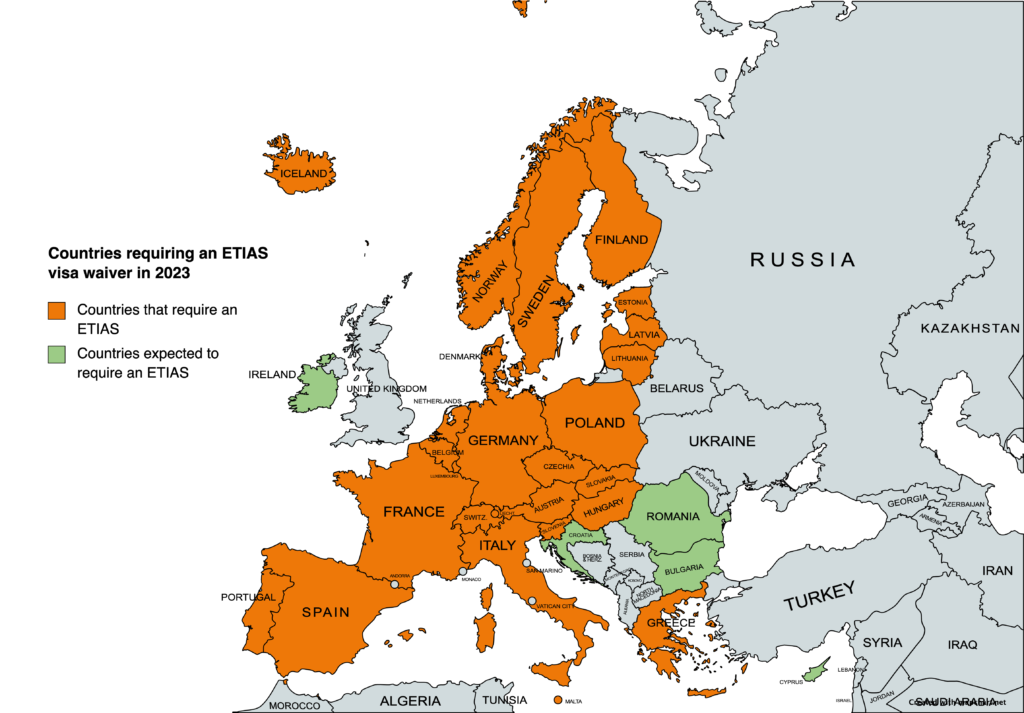If you plan on travelling to the Netherlands or practically anywhere in Europe in 2023, you may be in need of an ETIAS visa waiver.
The ETIAS visa waiver is an authorisation which allows foreign travellers to enter Schengen countries for a total stay of 90 days per entry.
Whether you’re going on vacation or on a business trip, if you’re a visa-exempt traveller (meaning you can enter Europe without applying for a visa), you’ll be required to register with ETIAS for short stays by November 2023 — otherwise, you could be refused entry.
If you don’t know where to start or whether you actually need an ETIAS visa waiver to enter the Netherlands, we’ve got all the information you need!
Let’s dive in, shall we?
Why do I need an ETIAS visa waiver?
From 2023 onwards, 22 European Union countries and 4 non-EU members will implement the ETIAS system (European Travel Information and Authorisation System).
This means that the ETIAS visa waiver will become a requirement for visa-exempt travellers heading to many EU countries:
ETIAS countries: Austria, Belgium, Czech Republic, Denmark, Estonia, Finland, France, Germany, Greece, Hungary, Iceland, Italy, Latvia, Liechtenstein, Lithuania, Luxembourg, Malta, Netherlands, Norway, Poland, Portugal, Slovakia, Slovenia, Spain, Sweden, Switzerland
Other countries that have recently joined the EU, such as Croatia and Cyprus, haven’t yet signed the agreement for the ETIAS program but are expected to do so soon.

Once the system is implemented, foreign citizens who don’t need a visa to enter Europe will need to complete an ETIAS registration before travelling to the orange-coloured countries for short stays.
Warning: The ETIAS visa waiver is not a substitute for a student or work visa. So, if you need a visa to enter the Netherlands for your work or studies, you will still need to apply for a travel visa to enter.
Why are EU countries implementing the ETIAS system?
The main goal of the ETIAS travel permit is to strengthen security at the borders of the Schengen passport-free zone, which includes the Dutch border.
With ETIAS, countries will prescreen visa-exempt travellers and look for potential security or health risks before travellers even reach the area.
Once you do have your ETIAS visa waiver, you’ll be able to travel anywhere in the Schengen Area as a visa-exempt citizen.
When should I apply for it?
With the ETIAS system being implemented in November next year, it will only be possible to apply for the travel permit closer to that time.
READ MORE | Schengen or tourist visa for the Netherlands? A guide on everything you need to know
If you’re dreading going to an embassy or doing all the paperwork, we’re glad to tell you that that won’t be necessary at all — the application process is done 100% online through a short application form.
How can I apply for an ETIAS visa waiver?
The ETIAS registration process is a quick and easy questionnaire about your basic personal details, so it should only take you a matter of minutes to finish.
You won’t need to scramble through all your old files to search for your birth certificate or any paper that says you actually exist. The only document you’ll need is your passport. 🎉
Though you will need to do a couple of other things to get the job done, these include:
- Completing the online ETIAS application form
- Provide the required information (passport details, email address, etc.)
- Pay the ETIAS application fee (€7) with a debit or credit card
After your ETIAS visa waiver gets approved, it will be electronically linked to your passport — although it’s advised to have it printed just in case. 🥸
In the very rare case it gets declined, you’ll receive an email with information on how to continue with the process.
Tip: If you’re someone with dual nationality, make sure to use the same passport when applying for the ETIAS visa waiver and use it later to travel to Europe.
How long will an ETIAS authorise my entry?
The ETIAS visa waiver will provide you with a multiple-entry travel authorisation to all 26 Schengen countries.
And, there’s no need to keep applying for the visa waiver each time you travel since it’s valid for three years starting from the date it’s issued.
So, as a visa-exempt citizen, as long as your passport hasn’t expired or you’ve reached your three-year mark, you’ll be good to enter those countries without having to even think about it.
Are you one of the lucky travellers that have to apply for an ETIAS visa waiver next year? Tell us in the comments below!

I have high optimism for the commencement of this ETIAS visa. It will roll away the bottleneck of visa hassles for vacation and short stay enthusiasts. Great idea and good innovative thinking. Waiting with rapt attention!!!
Am guessing if you are a British citizen with residency in the Netherlands it won’t be necessary?
If I still need the existing visas to enter then this new ETIAS “waiver” looks to me just a way to cash in 7€ per person for entering an EU country. And when you pay for entering a country it is a visa, not a waiver.
It is unclear which documents to be presented. If I have to acquire a goverment issued document that I’m not convited and with no criminal record, I’ll need to go to a courtyard and pay for it in order to get it. This is an additional cost for me. If required a full list of my previos employers and places I’ve worked it will be very hard to acquire if not impossible as one of the companies I’ve worked for doesn’t exist anymore for years.
And where should I apply. At https://www.etiasvisa.eu.com/ ?